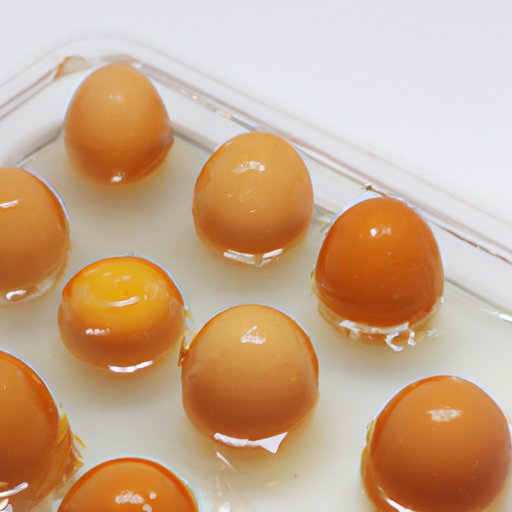Introduction
Have you ever opened your fridge to find an egg with no clear expiration date? Or worse, cracked an egg into a bowl only to be met with a rancid smell? These scenarios are all too common, but luckily, there are simple ways to determine if your eggs are still good to eat. In this article, we will explore the best methods for testing egg freshness, offer tips for proper egg storage, debunk common myths and misconceptions about egg freshness, and even provide recipe ideas for eggs that might be a little past their prime.
The Float Test
The float test is a simple and reliable way to determine if an egg is past its prime. To perform the float test, fill a bowl with cold water and gently place the egg in the water. If the egg sinks to the bottom and lays flat on its side, it’s still fresh. If the egg stands upright on the bottom or floats to the top, it’s past its prime and should not be eaten.
You might be wondering why this test works. The answer is simple: as eggs age, they naturally lose moisture and carbon dioxide, which creates an air pocket inside the shell. The larger the air pocket, the more likely the egg is to float. A fresh egg will have a smaller air pocket and will therefore sink to the bottom of the bowl.
Using Your Senses
Another effective way to test egg freshness is to use your senses of smell, touch, and sight. A bad egg might have a rotten or sulfuric smell, a slimy or sticky texture, or a yolk that’s flat or discolored. Visually, a bad egg might have a cracked or dirty shell, or an abnormally thick or thin white.
It’s important to trust your instincts when it comes to food safety. If you have any doubts about an egg’s freshness, it’s always better to err on the side of caution and toss it out.
Best Practices for Storage
Proper storage can help extend the life of your eggs and prevent spoilage. Eggs should always be refrigerated, even if they’re sold at room temperature at the store. This is because eggs are porous and can absorb odors and bacteria from other foods in the fridge.
When storing eggs, it’s best to leave them in their original carton. This will help protect them from moisture loss and limit their exposure to light and air. If you’re worried about keeping track of expiration dates, you can use a permanent marker to mark the date on the egg carton when you bring them home from the store.
Common Myths and Misconceptions
There are many myths and misconceptions surrounding egg freshness. One common myth is that washing eggs can help remove bacteria and extend their life. In reality, washing eggs can actually increase the risk of contamination by removing the egg’s natural protective coating.
Another myth is that the sell-by date on the egg carton is the same as the expiration date. In fact, eggs can still be safe to eat for several weeks after the sell-by date, as long as they’ve been stored properly and passed the float test.
Recipes for Older Eggs
If you have eggs that are a little past their prime, don’t despair! There are still plenty of delicious recipes that you can make with them. Hard-boiled eggs are a great snack or addition to a salad, while frittatas and quiches can be made with a variety of vegetables and cheeses.
Just remember to use the float test before using any eggs that are past their expiration date. If an egg floats, it’s not safe to eat and should be discarded.
Conclusion
Determining egg freshness doesn’t have to be a guessing game. By using the float test, trusting your senses, properly storing your eggs, and understanding common myths and misconceptions, you can feel confident that the eggs you’re eating are safe and delicious. And if you do end up with eggs that are past their prime, remember that there are still plenty of recipe ideas to help prevent food waste.
